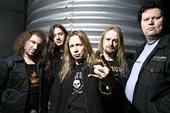Stratovarius was founded in 1982 in Finland under the name Black Water. They went through a number of personnel changes and changes in style before the band found its own voice. The founding members were Tuomo Lassila, Staffan Stråhlman, and John Vihervä. By 1984, Timo Tolkki entered the band, replacing Stråhlman on guitar, changed the name to Stratovarius (a portmanteau of Stratocaster and Stradivarius) and taking up vocal duties as well. Tolkki became the driving force and mastermind of the band, assuming relatively complete control of the song-writing. He brought along not only strong rock influences, but also a neo-classical tinge. The band released a demo to various record companies by 1987, finally being picked up by CBS Finland. In 1989, their debut album Fright Night was released, following two singles.
After being dropped by CBS, the band went through several member changes, but they managed to release an album on another label and they also toured a bit. In 1994 they released their third album, Dreamspace, featuring new bass player Jari Kainulainen, (who joined the band as 70% of the new material was already recorded) which was a great success. Tolkki decided to stop singing for the band, and they hired a full-time singer: Timo Kotipelto. The release of Fourth Dimension in 1995 was a great success, but internal differences in the band, particularly of the style the band was going for, prompted the departure of long-time drummer Tuomo Lassila and keyboardist Antti Ikonen. Two new non-Finnish members were recruited: Swedish keyboardist Jens Johansson, of Yngwie Malmsteen fame; and German drummer Jörg Michael. With the fifth release Episode, Stratovarius had finally found its sound and had a strong, diverse line-up. Episode was a grand project, featuring a large choir and a string orchestra. It spawned some of the all-time greatest Stratovarius hits, such as "Father Time" and "Will The Sun Rise".
This line-up released three hugely successful albums over the years: Visions in 1997, Destiny in 1999, and Infinite in 2000. With every album, their fame and fan-base expanded, and they started gaining a stronger following outside Scandinavia, particularly in Japan.
In 2003, the band released its most epic project yet, the two album suite named Elements. With these albums, they reached a peak in their progressive and symphonic style of power-metal. The first album, Elements, Pt. 1, was released in early 2003, followed by a world tour. Elements, Pt. 1 was followed by Elements, Pt. 2, also released on Nuclear Blast records in the same year with the hit single "I Walk To My Own Song".
In late 2003, the band broke up, with Timo Kotipelto and Jörg Michael leaving after a very vaguely explained conflict. Tolkki hired a new singer, Katriina "Miss K" Wiiala, and Anders Johansson of Hammerfall (Jens' brother) temporarily on drums. The rest of 2004 saw virtually complete silence from the band.
In January 2005, an announcement was released that Stratovarius had reunited with the old line-up. Timo Tolkki seemed to have recovered from his illness. In June 2005, Tolkki announced that the band's bassist, Jari Kainulainen, had left the band due to personal reasons. He was since replaced by Lauri Porra.
Stratovarius then released the self-titled album Stratovarius in September 2005, featuring the popular single "Maniac Dance". During this time, Stratovarius began a world tour, started in Argentina, which included a North American leg, where they toured the United States and Canada for the first time in the band's history. They played at such events as Atlanta's "Prog Power", and in well known venues such as "B.B. King's House Of Blues" in New York and Philadelphia's "Trocadero Theatre". The tour also included a long European tour, and a handful of Japanese and Chinese cities.
Later on in 2006 Stratovarius played summer festivals in Europe and completed a two week tour of North and South America.
The band is now in pre-production for a new record, with the working title "R R".
